The Google Nexus 9 Review
by Joshua Ho & Ryan Smith on February 4, 2015 8:00 AM EST- Posted in
- Tablets
- HTC
- Project Denver
- Android
- Mobile
- NVIDIA
- Nexus 9
- Lollipop
- Android 5.0
CPU Performance
While Denver’s architecture is something fascinating to study, it’s important to see how well this translates to the real world. Denver on paper is a beast, but in the real world there are a number of factors to consider, not the least of which is the effectiveness of NVIDIA’s DCO. We’ve laid out that Denver’s best and worst case scenarios heavily ride on the DCO, and for NVIDIA to achieve their best-case performance they need to be able to generate and feed Denver with lots and lots of well optimized code. If Denver spends too much time working directly off of ARM code or can’t do a good job optimizing the recurring code it finds then Denver will struggle. Meanwhile other important factors are in play as well, including the benefits and drawbacks of Denver’s two cores versus competing SoC’s quad A15/A57 configurations, and in thermally constrained scenarios Denver’s ability to deliver good performance while keeping its power consumption in check.
In order to test this and general system performance, we turn our suite of benchmarks that include browser performance tests, general system tests, and game-type benchmarks. As Denver relies on code-morphing to enable out of order execution and speculative execution, most of these benchmarks should be able to show ideal performance as loop performance in Denver is basically second to none. While most of these benchmarks are showing their age, they should be usable for valid comparisons until we move to our new test suite.
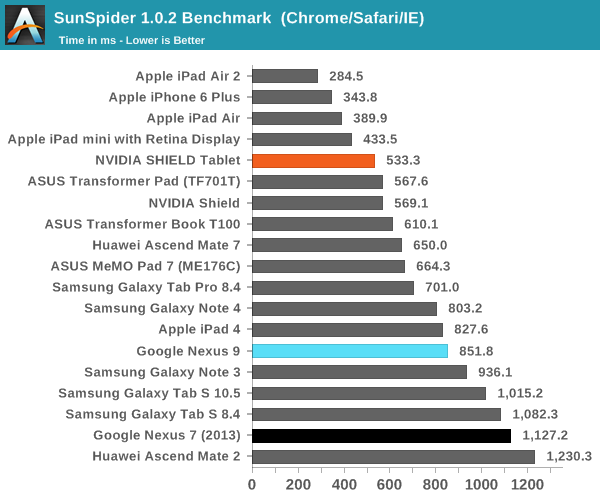
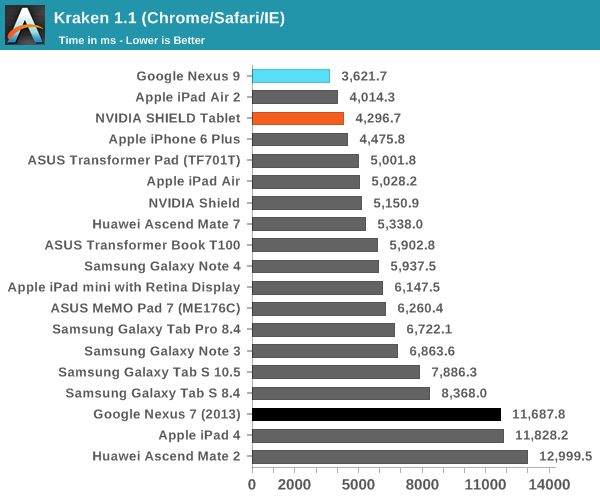
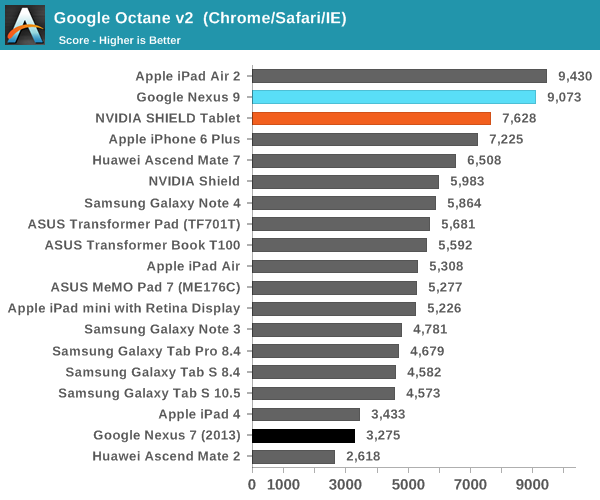
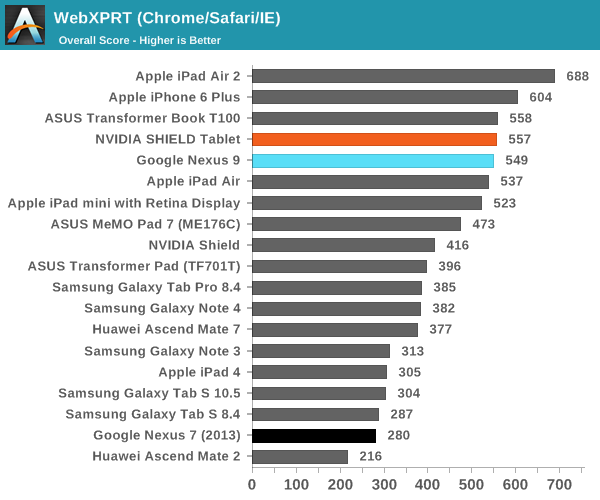
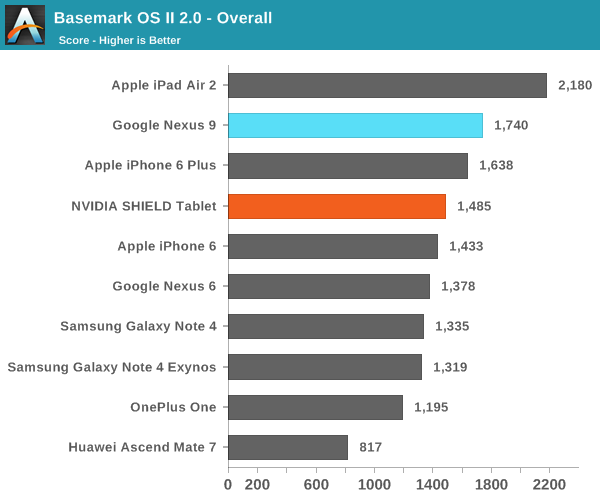
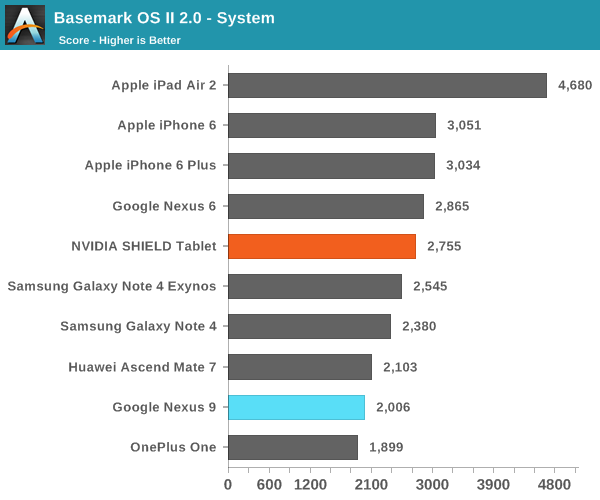
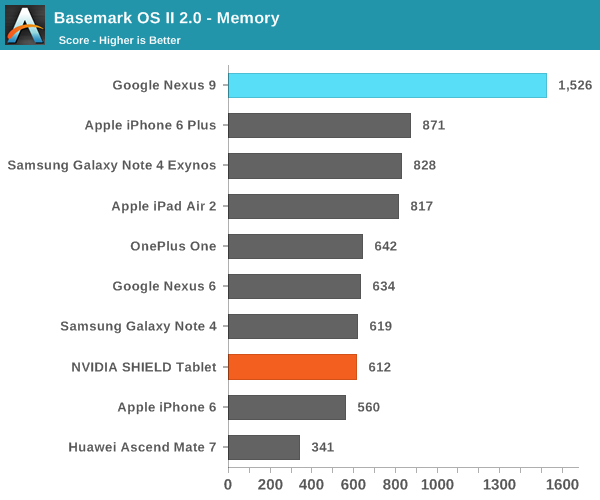
The Basemark System test seems to contribute quite strongly to how the Nexus 9 performs in the overall subtest. Given that this is a storage performance benchmark, it's likely that Basemark OS II has issues similar to Androbench on 5.0 Lollipop or that random I/O is heavily prioritized in this test.
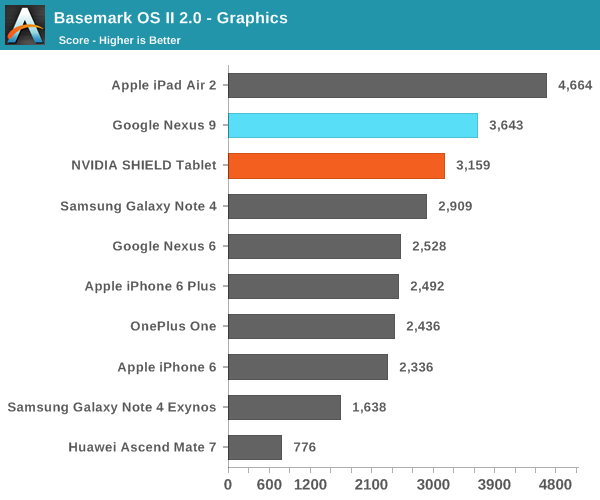
There's a noticeable performance uplift in the graphics test, and although not exactly part of the CPU this does seem at least somewhat plausible as GPU driver updates can improve performance over time.
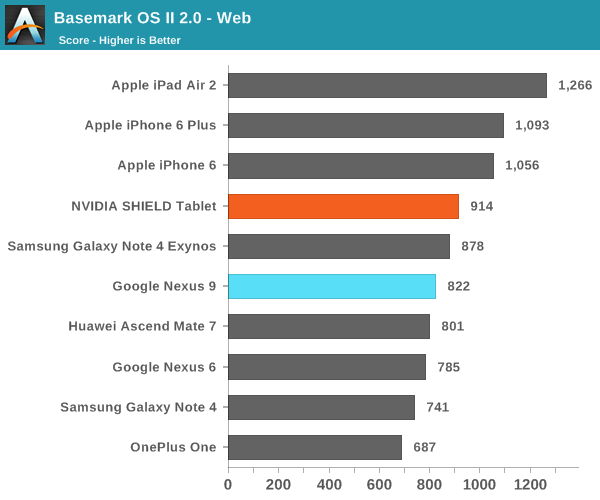
Overall, performance seems to be quite checkered, although improved from our initial evaluation of the Nexus 9. Unfortunately, even in benchmarks where the DCO should be able to easily unroll loops to achieve massive amounts of performance, we see inconsistent performance in Denver. This may come down to an issue with the DCO, or even more simply the fact that Denver is spending more time than it would like to directly executing ARM code as opposed to going through the DCO.
In this case looking at the SunSpider and Kraken javascript benchmarks offers an interesting proxy case for exactly that scenario. SunSpider on modern CPUs executes extremely quickly, so quickly that the individual tests are often over in only a couple of dozen of milliseconds. This is a particularly rough scenario for Denver, as it doesn’t provide Denver with much time to optimize, even if the code is run multiple times. Meanwhile Kraken pushes many similar buttons, but its tests are longer, and that gives Denver more time to optimize. Consequently we find that Denver’s SunSpider performance is quite poor – underperforming even the A15-based Tegra K1-32 – while Denver passes even the iPad Air 2 in Kraken.
Ultimately this kind of inconsistent performance is a risk and a challenge for Denver. While no single SoC tops every last CPU benchmark, we also don’t typically see the kind of large variations that are occurring with Denver. If Denver’s lows are too low, then it definitely impacts the suitability of the SoC for high-end devices, as users have come to expect peppy performance at all times.
In practice, I didn't really notice any issues with the Nexus 9's performance, although there were odd moments during intense multitasking where I experienced extended pauses/freezes that were likely due to the DCO getting stuck somewhere in execution, seeing as how the DCO can often have unexpected bugs such as repeated FP64 multiplication causing crashes. In general, I noticed that the device tended to also get hot even on relatively simple tasks, which doesn't bode well for battery life. This is localized to the top of the tablet, which should help with user comfort although this comes at the cost of worse sustained performance.










169 Comments
View All Comments
mkygod - Saturday, February 7, 2015 - link
I think so to. The 3:2 ratio is one of the things that Microsoft has gotten right with their Surface Pro devices. It's the perfect compromise IMOUtilityMax - Sunday, February 8, 2015 - link
I am a little perplexed by this comment. A typical user will be on the web 90% of time. Not only the web browser does not need to be natively designed or optimized for any screen ratio, but it also will be more usable on a 4:3 screen. So will the productivity apps. The only disappointment for me on the 4:3 screen would be with watching the widescreen videos or TV shows. Moreover, there is quite a bit of evidence than a lot of the next generation tablets will be 4:3. Samsung's next flagship tablet supposedly will be 4:3.gtrenchev - Wednesday, February 4, 2015 - link
Anandtech is becoming more and more boring last year. Sparse on reviews, short on tech comments, lacking on depth and enthusiasm. I can see Anandtech has become a just job for you guys, not the passion it was for Anand :-) And yes, his absence is definitely noticeable.George
Ian Cutress - Wednesday, February 4, 2015 - link
Was the Denver deep-dive not sufficient enough? Always welcome for comments.As for timing, see Ryan's comment above.
We've actually had a very good quarter content wise, with a full review on the front page at least four out of every five weekdays if not every weekday.
milkod2001 - Wednesday, February 4, 2015 - link
Why not to post on your forum some sort of suggestion box/poll where all could say what should get reviewed first so some folks won't cry where is the review of their favorite toy :) ?Impulses - Wednesday, February 4, 2015 - link
Because they'll still cry regardless, and they can't possibly work entirely based on readers' whim, doesn't make sense logistically or nor editorially... Readers might vote on five things ahead of the rest which all fall on the same writer's lap, they won't all get reviewed before the rest, or readers might not be privy to new hardware because of NDAs or cases where Anandtech can't source something for review.tuxRoller - Thursday, February 5, 2015 - link
While I enjoyed the review, I would've loved to have seen the kind of code driven analysis that was done with Swift.In particular, how long does it take for dco to kick in. What is the IPC for code that NEVER gets optimized, and conversely, what is the IPC for embarrassingly instruction-wise parallel code? Since it's relying on ram to store the uops, how long does the code need to run before it breaks even with the arm decoder? Etc.
victorson - Wednesday, February 4, 2015 - link
Are you guys kidding? Better late than never, but heck.. this is freaking late.abufrejoval - Wednesday, February 4, 2015 - link
Thanks for making it worth the wait!The in-depth analysis of Denver is uniquely Anandtech, because you can't get that anywhere else.
And while Charly D. is very entertaining, the paywall is a bit of an impediment and I quite like again the Anand touch of trying to be as fair as possible.
I was and remain a bit worried that there seems to be no other platform for Denver, which typically signals a deeper flaw with an SoC in the tablet and phone space.
While I'm somewhat less worried now, that Denver might be acceptable as a SoC, the current Nexus generation is no longer attractive at these prices, even less with the way the €/$ is evolving.
Taneli - Wednesday, February 4, 2015 - link
eDRAM cache à la Crystalwell would be interesting in a future Denver chip.